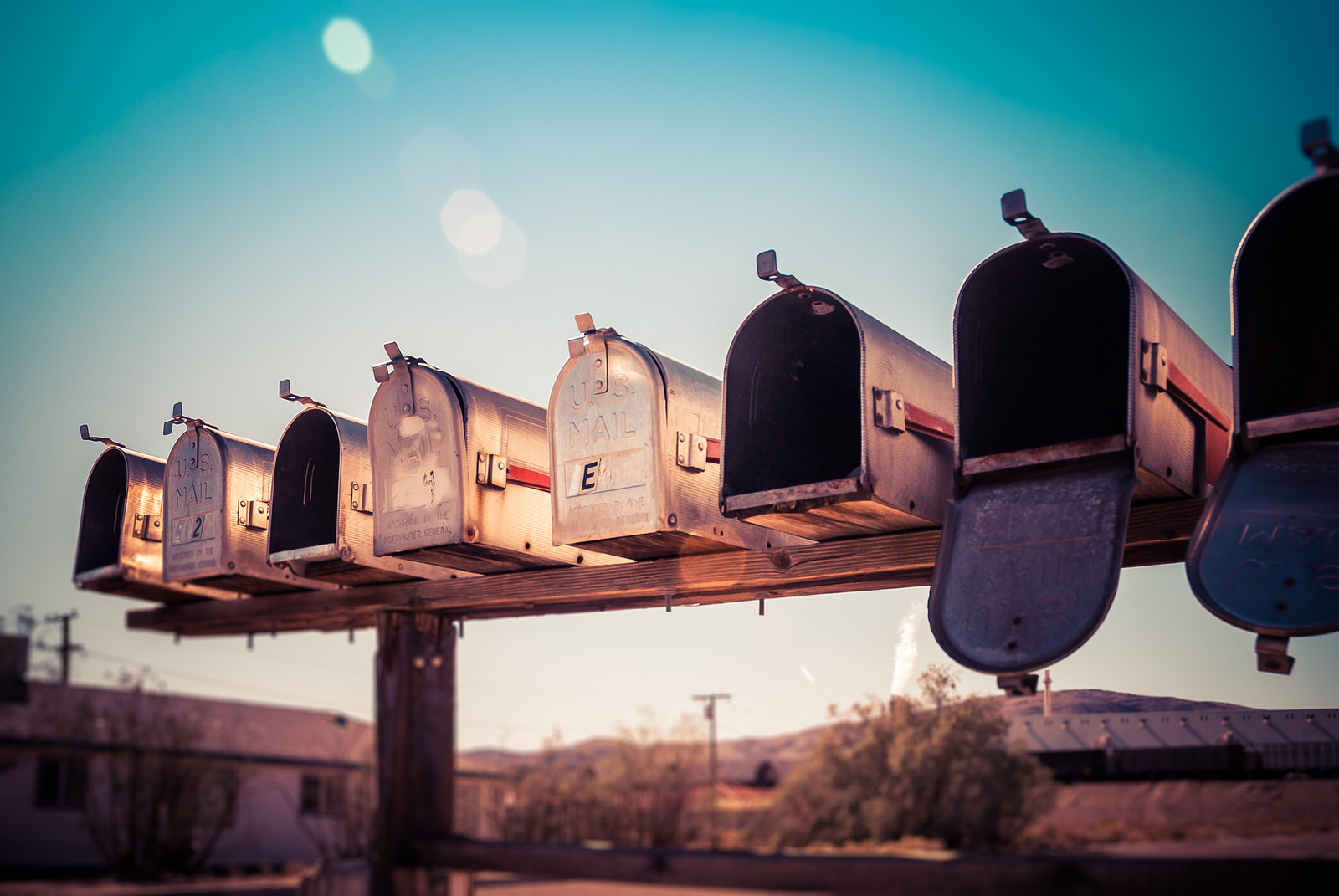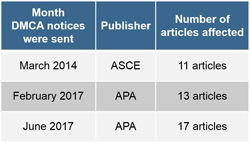
Back in 2014, the University of California got its first set of DMCA takedown notices for eScholarship, UC’s open access repository and publishing platform. I wrote about it here on the OSC blog, which you can check out if you want to see our tips for authors who want to avoid receiving a takedown notice (short version: post the right version of your article).
I also said in that post that we’d report on any other notices that UC received for eScholarship, because we believe it’s important to be transparent about which publishers are using this procedure to target article sharing by their own authors. We’ve received two more sets of notices this year, and I haven’t posted about it until now. Mea culpa!
Summary of notices received to date
We received one notice in February 2017, and one in June. Both were sent on behalf of the American Psychological Association (APA). The February notice covered articles at 13 different eScholarship URLs, and the June one covered 17, for a total of 30. Our previous round (in 2014) covered 11 articles.

In sum, that means that we’ve been contacted by two publishers and taken down 41 articles as a result of takedown notices in our fifteen years as UC’s repository. This is for a repository that contains nearly 150,000 publications, about 60,000 of which are previously published works like these articles. And unlike a lot of repositories, we don’t have anyone checking our authors’ deposits or their publishing agreements. We ask people to confirm that they’re not infringing anyone else’s rights, and then we let them upload – just like YouTube or Flickr.
We don’t expect to hear from APA again
Around the time we got our second round of notices from APA, authors around the country were complaining, some of them loudly – see, for example, “Authors Peeved by APA’s Article Takedown Pilot” at The Scientist. Following the unflattering attention, APA issued a press release saying that in the future they will be “refocusing this program to target commercial piracy sites” rather than authors and their home institutions. However, APA is not changing their article sharing policy itself, nor have they retracted any of the notices already sent, so we proceeded as we have with previous notices, as outlined below.
What we do when we receive a takedown notice
We look at it closely. We check for all the requirements of a valid takedown notice. We look at the articles in the notice and make sure they are what the notice claims they are. For instance, with this set the sender (Attributor Corporation) said they were acting on behalf of APA, and that APA objected to the use of their final published version, rather than an author’s final manuscript, so we checked the versions and verified the article metadata, including publisher. We also reviewed APA’s standard publication agreement to see if they require copyright transfer. If they didn’t, they wouldn’t be the copyright owner and shouldn’t have sent the notice.
We notify stakeholders. We’re a repository for all of UC, and these notices affected authors at five of our campuses. We sit in an office building our authors have probably never heard of, but they know their campus library, and their campus librarians may already know them. So when we get takedown notices we reach out to the UC libraries, as well as a few other groups in the UC system that follow scholarly communication and legal issues. Then when we contact the authors to let them know about the takedown notice, we can provide them with the name of a human being in their campus library who can answer their questions; the campus librarian is already briefed on the situation and the wider context and ready to talk to the author.
We take down the articles. The law requires that we act “expeditiously” to remove, or disable access to, the material that’s allegedly infringing copyright when we receive a valid notice. So we do. But as with other works in the repository, even if we take down the full text, we leave the metadata record up. Then if people follow a link to a page they find a message that “This document is no longer available due to a copyright claim by the American Psychological Association (APA)” rather than a broken link.
We contact the authors. We have a form email for this that I shared in my 2014 post. We’ve adapted it a bit since then, and will continue to do so as we find ways to improve it (hat tip to UC Davis’s Michael Wolfe for some of the recent changes). Here’s the most recent version, which we sent to the authors affected in June, with a campus librarian cc’d:
Dear Dr. [Last Name]:
We recently received a notification on behalf of the American Psychological Association (APA), asserting that the presence of your article “[Article Title],” in eScholarship (UC’s open access repository) infringes the APA’s rights under copyright law. Following the procedures of the Digital Millennium Copyright Act (DMCA), we have removed the PDF from eScholarship. The information about the article is still available here:
[eScholarship link]
We would like to encourage you to maintain the open availability of your work in eScholarship. Depending on your circumstances, you may have one or two options:
1) Upload a different version of your article.
We note that you have uploaded the publisher’s final PDF version, which appears to be downloaded from APA. The UC Open Access Policy requires deposit of the author’s final manuscript version, which the UC Publication Management System deposit screen describes as “the version after peer review but before the publisher formats it in the finalized layout.” APA’s policies also encourage the use of this version.To replace the removed article with this preferred version, just use the publication management system to add the new file. The article’s eScholarship URL will remain the same, and it will retain all usage data recorded so far. If you no longer have your author’s final version, you can create an unformatted version using the text of the version you do have, and you can post that. [LIBRARY CONTACT] at the [CAMPUS] library, copied on this message, can help you with the creation of this file, or finding the right place to add it in the publication management system, if you need assistance.
2) Assert your right to post this version of your article.
If you believe that the posted version of your article does not infringe your publisher’s copyright interest you can send us a counter-notification to have the article replaced. For instance, if neither you, nor someone authorized to act on your behalf, signed an agreement transferring copyright to the APA, or if you had permission from the APA to post the publisher’s formatted PDF, then a counter-notification might be appropriate. Once we receive a valid counter-notification from you, we will forward the notice to APA. APA may then seek a court order, or initiate legal proceedings. If not, we will replace your article in eScholarship within 14 days.If you would like more information about DMCA notice and takedown procedures generally, there is a helpful FAQ available from Lumen, a research project initiated by law schools and nonprofit organizations.
The UC Libraries also have staff and resources that can help. If you have questions about this process or need any assistance, please contact [campus contact name and email address] or help@escholarship.org.
Sincerely,
Günter Waibel
Executive Director
California Digital Library
We wait. After we contact the authors, they can send us a counter-notification asserting that there was no copyright infringement, e.g. because the publisher doesn’t own the copyright or the author had permission for the posting. (No one has done this.) They might take our suggestion and post a different version of the article. (A handful of people have done so, but we wouldn’t know if we hadn’t gone back to check a few months later.) And we file a copy of our notice with the Lumen Database (formerly chillingeffects.org) because we believe in their goals about transparency and education relating to these kinds of communications. (I finally sent them our APA notices in September.)
Then we post about it here. If it happens again, I’ll try to be a little more prompt with that part.
Tags: APA, Copyright, DMCA Takedown Notices, eScholarship



